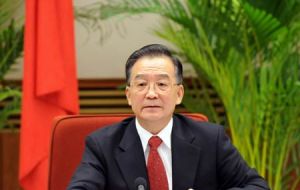MercoPress. South Atlantic News Agency
Markets find optimism in Chinese economy despite slower growth
 Premier Wen Jiabao said that boosting investment would also be crucial for stabilising growth
Premier Wen Jiabao said that boosting investment would also be crucial for stabilising growth China's economy has grown at its slowest pace in three years as investment slowed and demand fell in key markets such as the US and Europe. GDP rose by 7.6% in the second quarter, compared with the same period a year ago. That is down from 8.1% in the previous three months.
In March, Beijing cut its growth target for the whole of 2012 to 7.5%.
China accounts for about a fifth of the world's total economic output and any slowdown may hamper a global recovery. At the same time, many of Asia's biggest and emerging economies are becoming increasingly reliant on China as a trading partner.
“China has been a big factor for the slowdown in Asia this year,” said Tai Hui from Standard Chartered Bank in Singapore.
He added that if China's growth does not pick up in the second half of the year then “that's going to mean a very difficult second half for a lot of the manufacturers in this region”.
However, despite Friday's slower growth figures many analysts tried to allay fears of a so-called hard landing in China's economy and its subsequent impact on the rest of the world.
“If you get a drop in the growth rate of 1 percentage point per annum, that's not a lot in terms of the world gross domestic product,” Edmund Phelps, a professor of political economy at Columbia University and a Nobel prize winner, told the BBC.
He added that China had a lot of ammunition to counter the slowdown, some of which it has already started using because of the patchy recovery in the US, and the ongoing debt and economic issues in the Euro zone.
China's central bank has cut the amount of money banks must keep in reserve in order to boost lending, and it recently cut the cost of borrowing twice in one month.
Earlier this week, Premier Wen Jiabao said that boosting investment would also be crucial for stabilising growth, fuelling expectation that more state-driven stimulus measures would be on the way.
Now that China's growth is slowing, there are calls for yet another stimulus,“ said Edward Chancellor, global Strategist at investment management firm GMO.
But analysts warned that China's growth problems may not be solved by a simple injection of capital and a new round of government spending. Especially as many of today's issues can be traced back to the way the country tried to kick start growth after the global financial crisis in 2008-2009.
At the time the central government began pumping huge amounts of money into the economy, mainly on infrastructure and construction spending. This led to excess capacity, a surge in property prices and an increase in consumer costs and inflation. Faced with these problems and amid fears that the economy may be overheating, policy makers decided to implement measures to curb lending and slow inflation.
Those steps, along with a drop in demand for Chinese goods from key markets such as Europe and the US, have caused the most recent cycle of slowing growth. In 2011, China's economy grew by 9.2%, down from 2010's figure of 10.4% growth.
But while the longer-term trend is of a slowdown, China also released a number of other figures on Friday and they painted a more nuanced and mixed picture of the economy.
According to the official figures, retail sales increased by 13.7% in June, little changed from May's 13.8% figure. At the same time, electricity output, an indicator that many analysts use to calculate current business and consumer activity, was also flat in June at 393bn kilowatt-hours.
Optimists, however, would have been buoyed by news that new bank loans increased to 144.4bn in June, up from 124.4bn in May.
The BBC's John Sudworth in Shanghai says the data will do nothing to stop the economic squabbling over whether China is heading for a hard or soft landing.
”Rising stock piles of coal paint a vivid picture of just the kind of indicator the bears will use when arguing that 7.6% is proof of the impending economic catastrophe,“ he says.
”But here's another picture for you. A new DHL delivery hub built on the outskirts of Shanghai shows that there are still plenty of bulls out there too.
”For them 7.6% is probably a turning point and they also have their indicators of choice to support the case”. (BBC).-




Top Comments
Disclaimer & comment rulesCommenting for this story is now closed.
If you have a Facebook account, become a fan and comment on our Facebook Page!